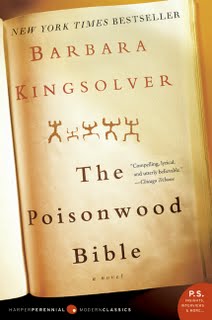The Poisonwood Bible: A Novel

Barbara Kingsolver's "The Poisonwood Bible: A Novel" (HarperCollins, 1998, 543 pp.) is an epic by definition and in scope and proportion. I realize now I was just cutting my teeth on Kingsolver's earlier, shorter yet just as vividly and potently written novels, "The Bean Trees" and "Pigs in Heaven." I am now convinced of - or happily reacquainted with - her genius.
What begins as the tale of an evangelical Baptist family on a mission trip to the Belgian Congo in the late 1950s, evolves into a larger more allegoric tale.
Nathan and Orleanna Price bring their four daughters, Rachel, twins Leah and Adah, and baby girl Ruth May into the remote jungle village of Kilanga fully unprepared for what awaits them. They bring with them cake mixes, bean seeds and Sunday best clothes, not realizing the climate will render such things useless.
The book's chapters are narrated by the female characters in turn. The viewpoints range from self-centered teen Rachel, who worries more about her appearance than anything else, to crippled Adah, who, due to a birth deformity, walks with a limp and tends to see things differently - literally: She reads books back to front, speaking and reading the words backwards. Leah drinks in Kilanga, becomes a huntress, a teacher, a speaker of its language. Then there's the innocent Ruth May, wide-eyed and accepting, who teaches the village children to play "Mother May I."
I expected the book to end with the family's return to the states. But the majority of the family never go back to their native land. We follow the girls into their very different adulthoods and witness how Africa has marked and changed them forever.
I can tell you that one of the daughters loses her life on that vast continent, as Orleanna will tell you on page one of the novel. But she won't tell you which one. That's revealed a few hundred pages later.
Orleanna (the mother): "We aimed for no more than to have dominion over every creature that moved upon the earth. And so it came to pass that we stepped down there on a place we believed fully unformed, where only darkness moved on the face of the waters. Now you laugh, day and night, while you gnaw at my bones. But what else could we have thought? Only that it began and ended with us. What do we know even now? Ask the children. Look at what they grew up to be. We can only speak of the things we carried with us, and the things we took away."
The poisonwood bible, the basis of the novel, basically says that, well, "Tata Jesus" really is "bangala," a Kikongo word that can have several meanings, including most precious and most deadly. The bible, for a baptist preacher, is a much different set of life lessons when compared to the hundreds of years of oral traditions passed down through the ranks of the African villagers. Baptism, which may be a sacred rite for the Rev. Nathan Price, is equated with fear and certain death for the children of Kilanga (in a river rife with hungry alligators). Simlarly, their ways confounded the Rev. Price.
Ruth May: "Father is trying to teach everybody to love Jesus, but what with one thing and another around here, they don't. Some of them are scared of Jesus, and some aren't, but I don't think they love Him. Even the ones that go to church, they still worship the false-eye dolls and get married to each other time and time again. Father gets right put out about it."
There is also the political aspect of the novel. The Belgians, the Portuguese, the Americans and others who exploited the various African countries' resources (diamonds, people) and tried to force Africa to adapt to their ways might have won the battle, but not the war, Kingsolver seems to say. These conquerers and their pieces of history will dissolve into the greater story of Africa.
My journey through this novel, I can say with chagrin, took roughly a month (kind of an epic in itself). I got the audiobook out of the Pottstown Public Library for a 6-hour roundtrip in August. It was interesting because Kingsolver read the novel herself, and did the various girls' voices, Georgia accents and childish misconceptions and all.
But I didn't get through it all, because the tapes ran 10+ hours, and my check out time ran out. I traded them in for the actual book after my trip. I hauled that huge library book around for a long time! Not that the reading wasn't enjoyable, just that I've been busy and have only been reading a page or two here and there.
This morning, as I finished the novel, I was happy to be reunited with the voice of the Price sister/daughter who didn't make it. How fitting that she should narrate the end of the novel. She was there with the family all along, and urges them to move on with their lives.
Labels: Barbara Kingsolver, The Poisonwood Bible
 RSS
RSS



1 Comments:
Hi Ski,
Unlike you, this is the only Kingsolver book I have read. Like you I found it powerful and draining.
In the end (and its been a few years since I read it) I seem to recall feeling that there was no joy in the book.
The family reached a kind of equilibrium, separately, but I found myself thinking few of any of the characters would look back and ultimately decide their decision to go to Africa and try to do what they did was a good thing.
It was certainly useful as a reminder of the hubris of the mindset of western civilization. But then, I didn't need much help with that.
Karen has some other of her books if you want to borrow them.
Post a Comment
<< Home